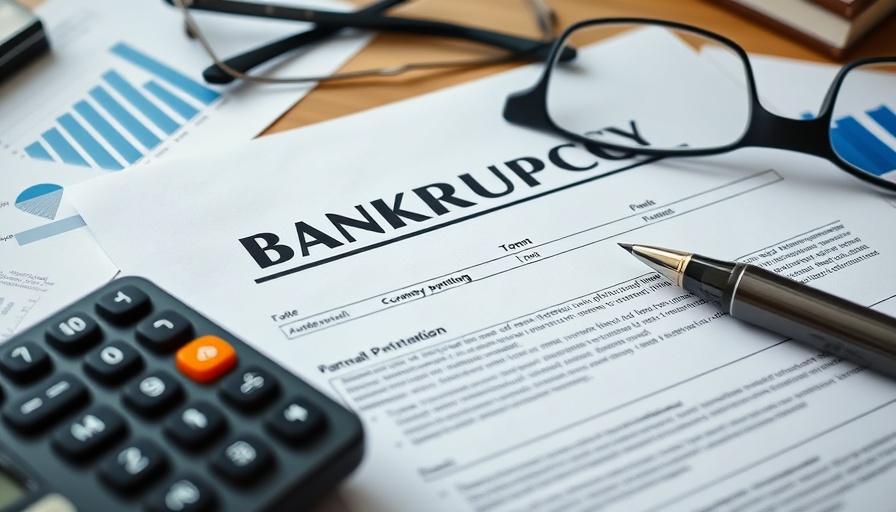
Understanding the Journey to Financial Recovery
Facing bankruptcy can feel overwhelming, but it's essential to recognize that it doesn't have to dictate your financial future. For business owners and entrepreneurs, the path to recovery is paved with opportunities to reclaim control over their finances. Many lenders are willing to extend loans even after bankruptcy, enabling individuals to rebuild and re-establish their financial health.
Bankruptcy's Impact on Loan Eligibility
Understanding how bankruptcy affects your ability to secure future loans is crucial. Bankruptcy serves as a legal procedure aimed at providing relief to individuals or entities unable to meet their debt obligations. While it offers a fresh start, it also significantly impacts your creditworthiness, which lenders evaluate when assessing loan applications.
Types of Bankruptcy: Which One Affects Your Future?
Familiarizing yourself with different bankruptcy types can illuminate your options:
- Chapter 7 Bankruptcy: Often referred to as liquidating bankruptcy, this process involves selling off non-exempt assets to pay creditors while discharging remaining eligible debts.
- Chapter 13 Bankruptcy: This form allows borrowers to establish a repayment plan, typically spanning three to five years, during which they pay off their debts gradually.
- Chapter 11 Bankruptcy: Common among businesses, it provides restructuring opportunities while allowing continued operations and repayment negotiations with creditors.
- Chapter 12 Bankruptcy: Designed specifically for family farmers and fishermen, enabling them to restructure debts while maintaining operations.
Navigating the Loan Landscape Post-Bankruptcy
Several loan options remain available even for those who have undergone bankruptcy. Whether seeking secured or unsecured loans, understanding the available types can aid in making informed decisions. Secured loans, such as home equity and vehicle loans, typically require collateral and can be easier to obtain post-bankruptcy. Meanwhile, unsecured loans, like personal loans or credit cards, might come with higher interest rates but can also aid in rebuilding credit.
Key Factors for Loan Approval After Bankruptcy
Several factors play a pivotal role in determining your eligibility for loans after bankruptcy. Lenders often look at:
- Creditworthiness: Improving your credit score post-bankruptcy is vital. Steps like paying bills on time and reducing existing debts can enhance your rating.
- Financial Documentation: Prepare detailed financial statements showcasing your income, expenses, and current financial situation.
- Requested Loan Amount: Being realistic about how much you need can significantly affect lender decisions.
- Business Plan: A well-drafted business plan demonstrates your strategy for repayment and is crucial for gaining lender confidence.
Strategies to Improve Your Loan Approval Chances
Once you’ve understood the factors influencing loan approval, implementing strategies to enhance your borrowing prospects becomes vital. Some effective methods include:
- Enhancing Your Credit Score: Regularly review your credit reports, dispute inaccuracies, and take steps to improve your score.
- Engaging Multiple Lenders: Different lenders have varying criteria. Exploring options means better chances of finding favorable terms.
- Preparing Financial Statements: Organizing your financial documents effectively highlights your financial stability to potential lenders.
- Developing a Convincing Business Plan: A clear, actionable plan not only supports your loan application but also delineates your business's future.
Choosing the Right Lender: A Critical Step
Finding the right lender can significantly impact loan approval and terms. Research lenders who specialize in offering loans to those with past bankruptcies. Such lenders often have flexible underwriting criteria and a better understanding of the unique challenges posed by bankruptcy.
Tools and Resources for Financial Empowerment
The journey after bankruptcy can be daunting, but leveraging tools and resources aids in effective financial planning. Resources such as small business financial planning workshops, professional financial advisors, and online financial management tools can help entrepreneurs align personal and business finances, establish cash flow strategies, and refine investment opportunities.
Final Thoughts: Embracing a Fresh Start
Remember, bankruptcy is just one chapter in your financial story - it does not end your journey. By understanding the types of bankruptcy, navigating the loan landscape, and employing strategic actions to improve your eligibility, you can empower yourself to rebuild your financial future. Take proactive steps today to explore your options tailored to your unique situation.
For more insights on managing your finances as a business owner, including wealth-building strategies and cash flow management tips, dive into our extensive resources tailored for entrepreneurs!
 Add Row
Add Row  Add
Add 




 Add Row
Add Row  Add
Add 

Write A Comment